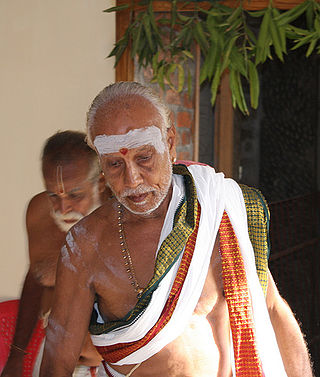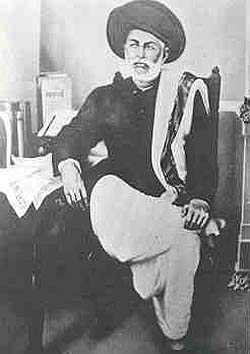
The historical Vedic religion constituted the religious ideas and practices among some of the Indo-Aryan peoples of the northwest Indian subcontinent during the Vedic period. These ideas and practices are found in the Vedic texts, and some Vedic rituals are still practiced today. It is one of the major traditions which shaped Hinduism, though present-day Hinduism is markedly different from the historical Vedic religion.
Brahman is a term in Hinduism for the metaphysical ultimate reality, the highest unchanging Universal Principle in the universe.

Iyers are an ethnoreligious community of Tamil-speaking Hindu Brahmins. Most Iyers are followers of the Advaita philosophy propounded by Adi Shankara and adhere to the Smarta tradition. This is in contrast to the Iyengar community, who are adherents of Sri Vaishnavism. The Iyers and the Iyengars are together referred to as Tamil Brahmins. The majority of Iyers reside in Tamil Nadu, India.
Brahma is the Hindu Creator God.

Purohita, in the Hindu context, means chaplain or family priest within the Vedic priesthood. In Thailand and Cambodia, it refers to the royal chaplains.
Deshastha Brahmin is a Hindu Brahmin subcaste mainly from the Indian state of Maharashtra and North Karnataka. Other than these states, according to authors K. S. Singh, Gregory Naik and Pran Nath Chopra, Deshastha Brahmins are also concentrated in the states of Telangana (which was earlier part of Hyderabad State and Berar Division), Andhra Pradesh and Madhya Pradesh (Which was earlier part of Central Provinces and Berar) Author Pran Nath Chopra and journalist Pritish Nandy say, "Most of the well-known saints from Maharashtra, Karnataka and Andhra Pradesh were Deshastha Brahmins". The mother tongue of Deshastha Brahmins is either Marathi, Kannada or Telugu.

The Smartatradition, also called Smartism, is a movement in Hinduism that developed and expanded with the Puranas genre of literature. It reflects a synthesis of four philosophical strands, namely Mimamsa, Advaita, Yoga, and theism. The Smarta tradition rejects theistic sectarianism, and is notable for the domestic worship of five shrines with five deities, all treated as equal – Ganesha, Shiva, Shakti, Vishnu and Surya. The Smarta tradition contrasted with the older Shrauta tradition, which was based on elaborate rituals and rites. There has been a considerable overlap in the ideas and practices of the Smarta tradition with other significant historic movements within Hinduism, namely Shaivism, Brahmanism, Vaishnavism, and Shaktism.
Karhaḍe Brahmins are a Hindu Brahmin sub-caste mainly from the Indian state of Maharashtra, but are also distributed in states of Goa, Karnataka and Madhya Pradesh.
Hebbar is a Hindu surname from Karnataka in India. It is found amongst various Brahmin communities, including Chitpavan Brahmins, Deshastha Brahmins, Havyaka Brahmins, Kota Brahmins, Panchagrama Brahmins, Shivalli Brahmins, Tuluva Hebbars, Sthanika Brahminss, Smartha Brahmins and Hebbar Iyengars.

Mohyal Brahmins are an Indian sub-caste of Saraswat Brahmins from the Punjab region, who are sometimes referred to as 'Warrior Brahmins'.
Anti-Brahminism is a term used in opposition to caste-based hierarchical social order which places Brahmins at its highest position. Initial expressions of Anti-Brahminism emerged from instances of pre-colonial opposition to the caste system in India, ideological influences during the colonial period, and from a colonialist Protestant Christian understanding of religion in the 19th century, which viewed "Brahminism" as a corrupted religion imposed on the Indian population. Reformist Hindus, and also Ambedkar, structured their criticism along similar lines following the 19th century criticism of "Brahminism," opposing the dominant position Brahmins had acquired by the time of British rule in the 19th century.
Dravida Brahmins is a sub-caste of the Telugu Brahmins of Andhra Pradesh in South India, who migrated from Tamil Nadu in history.
Wagle is a surname that occurs in multiple cultures.
Devrukhe Brahmins are one of five sub-castes of Maharashtrian Brahmins. This community is small in numbers compared to other Maharashtrian Brahmins such as Deshastha Brahmin, Konkanastha Brahmin and Karhade Brahmin.

Satyashodhak Samaj was a social reform society founded by Jyotiba Phule in Pune, Maharashtra, on 24 September 1873. The society endeavoured to mitigate the distress and sufferings of Dalits and women. It espoused a mission of education and increased social rights and political access for underprivileged groups, focused especially on women, peasants, and Dalits, in Maharashtra. Jyotirao's wife Savitribai was the head of women's section of the society. The Samaj disbanded during the 1930s as leaders left to join the Indian National Congress party.
Neopaney/Neupane or Nyaupane or Hindi a surname found mainly in Nepal and in significant communities in India and Bhutan. It belongs predominantly to Brahmin (Bahun) and Kshatriya (Chhetri) of Nepal and Indian territories of Sikkim, Darjeeling, Varanasi, Uttar Pradesh, Uttarakhand, Assam, Meghalaya and some are up to Bhutan and Myanmar. They belong to Kanyakubja Brahmin family of Pancha-Gauda Brahmans following Kaudilya/Kaudinya gotra, names after Sage Kaudilya.
Hussaini Brahmin is a Mohyal Brahmin community of the Punjab-region.
Chari is a Hindu Brahmin surname that encompasses various communities across India, with regional modifications as consistent with the local languages. Notable people with this surname include:





